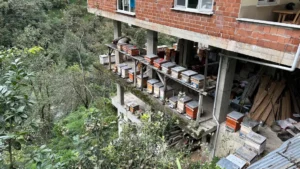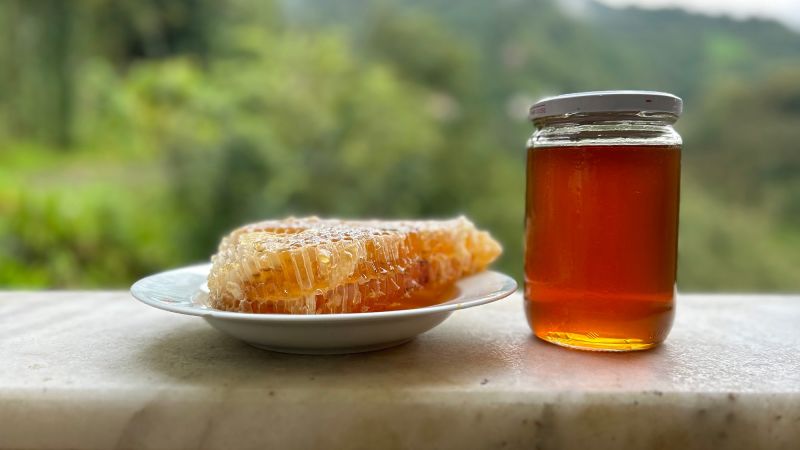In the small wooden hut elevated on metal-wrapped stilts, the drone is loud, high, and persistent.
Wearing his beekeeping suit, yet leaving his hands bare, Hasan Kutluata presses the bellows of his pine-filled bee smoker. Pale wreaths swirl in the air, reflecting the mist that drifts over the slopes of the densely forested Kaçkar mountains beyond.
The smoke serves to soothe the bees, concealing the pheromone they emit when they perceive a threat, which alerts other bees to prepare for an attack.
As Kutluata removes the lid from the round lindenwood hives, the hum swells to a peak — yet these bees are not agitated; it is merely their honey that is spirited.
We are here to gather deli bal — where bal translates to “honey” and deli signifies “crazy” or “mad.” The Black Sea region of Turkey is one of just two locations globally that produces this unique delicacy, with the other being the Hindu Kush Himalayan mountain range in Nepal.
“In our pristine forests, the purple rhododendron blossoms in spring,” Kutluata shares that. The bees gather nectar from the flowers, which is how we obtain the mad honey.
The nectar holds a naturally occurring toxin known as grayanotoxin. The quantity that ends up in the honey differs with each season and depends on the variety of flowers the bees have been enjoying. A spoonful can provide a mild, soothing effect, whereas a whole jar could result in a trip to the hospital.
For thousands of years, deli bal has served as a form of folk medicine, with a spoonful consumed daily to reduce blood pressure or utilized as a sexual stimulant. Currently, this potentially hazardous delicacy is available at a high price.

The honey that overcame a legion
Kutluata employs a knife to meticulously remove comb from the hive, the viscous elixir oozing thick and sweet as he collects it in a bucket.
Deli bal presents a dark amber red hue, accompanied by a sharp scent. There are distinct sensations that signal the presence of grayanotoxin: A herbal bitterness forms a foundation beneath the sweetness of the honey, while a burning heat lingers at the back of the throat.
Today’s honey displays all the characteristics. “We ought to be mindful of our eating habits.” “If we consume more, it could have an impact on us,” states Kutluata. “There is no hallucination involved.” It simply leads to dizziness, low blood pressure, a mild fever, nausea, and trouble walking.
It is advisable to use no more than a teaspoon or tablespoon. “We must exercise caution when consuming this honey,” Kutluata remarks. “Excess of anything can be detrimental.” Excessive consumption of honey can also be detrimental.
This is a dish that has defeated legions. In the 4th century BCE, the Greek military leader Xenophon described soldiers journeying near Trabzon on the Black Sea coast who indulged excessively in a sweet delicacy: “Not one of them could stand up, but those who had eaten a little were like people exceedingly drunk, while those who had eaten a great deal seemed like crazy, or even, in some cases, dying men.” They lay there in vast numbers, as if the army had endured a defeat, and a profound sense of despondency filled the air.
Exit, chased by a bear
“That’s enough for today; the bees are starting to attack,” Kutluata remarks. “Let’s begin our descent now.”
Once we return to solid ground, the ladder is reattached to the hut, preventing any further climbing. The foe that this mini-fortress is protected from isn’t Greek armies, but bears driven mad by honey.
The metal encircling the poles serves to deter bears from digging in with their claws, while the platform’s elevation, approximately 10 feet above the ground, is designed to prevent a mother bear from tossing her cub up to access the honey that is out of her reach.
Kutluata is acutely conscious of the risks. Two decades after the incident, he still bears scars on his hand and leg from the time he defended himself against a bear that had invaded his hives and succumbed to a deli bal stupor.
The bear, which seemed to be sleeping, awakened as Kutluata and his friends drew near, leading to a chase and struggle that resulted in Kutluata spending over a week in intensive care.
“Regardless of our fear of bears, we must proceed with this work,” he states. We will persist in our beekeeping efforts. We come across bears nearly every day. Each time we ascend the mountain, we encounter a bear.
When dangerous doses of dali bal aren’t involved, the bear doesn’t attack us. The bear flees from us, and we flee from the bear.
Hamlet of the bees
We climb into the truck and make our way along the twisting mountain paths to Kutluata’s family home, located near the village of Yaylacılar, close to Arili Köyü — the aptly named “village of the bees.”
His parents, wife, and son gather with us for lunch; they represent a beekeeping family spanning three generations. The table is arranged beneath the eaves of the traditionally designed house, where the unoccupied lower floor is filled with stacked box beehives.
“Our village is quite impressive.” The summers here are quite pleasant. There are no mosquitoes present. “It’s not comparable to the city, where the heat makes it unbearable to remain,” Kutluata remarks. “Here, it’s a life in harmony with nature.” There is a river where we can swim. It is completely silent here.
According to his wife Emine, the quality of the honey is influenced by the purity of the environment. “Our uniqueness lies in the natural surroundings, the elevation, and the lack of nearby settlements.” That significantly influences the production process.
Deli bal is merely one variety of honey that the family produces. Following the purple rhododendron, the white chestnut flower begins to bloom. Subsequently, the white rhododendron blooms.
During the summer, provided the weather remains dry, the bees of Kutluata can populate a hive in approximately 20 days.
“The longer honey remains in the hive, the greater its quality becomes.” “The quality is determined by the promille value,” he explains. Promille indicates the concentration of the honey. “A greater promille value indicates superior quality.”
“Chestnut honey is widely available, yet it truly stands out,” Emine remarks. “Regarding the promille value, it may reach 600, 700, or 800, while in other contexts, it could be 500 when considering quality.”
A meal fit for champions

In Turkish households, honey is a beloved breakfast essential, and the Kutluatas demonstrate their delightful method of combining it with butter to create a rich spread for bread, ensuring a robust and energizing beginning to the day.
The food has been recognized for its natural antibiotic properties for a long time; it stands as one of the oldest medicines in the world.
To Emine, honey symbolizes health. When my throat feels sore, I reach for honey. When I have a cough, I reach for honey. “When I feel weak, I find myself reaching for honey once more.”
To Kutluata, bees serve as a source of restoration for mental health. “When I feel low, I turn to the bees.” “When I’m stressed or feeling troubled from work or the outside world, I turn to the bees,” he says. “I open the hive, tend to them, and I experience a sense of peace and happiness.” All my stress and troubles vanish.

Deli bal is legally sold in Turkey and is permitted in numerous other countries. Nonetheless, the US Food and Drug Administration does not endorse its consumption.
“Consumers should verify the labeling of honey to confirm it is not designated as ‘mad honey’ or promoted for its intoxicating properties,” an FDA spokesperson informed that.
Consuming honey that contains a significant level of this toxin can result in ‘mad honey’ poisoning, which may manifest as nausea, vomiting, or dizziness. This form of poisoning is uncommon.



0 Comment